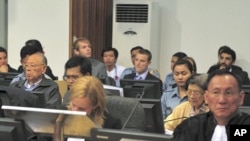The U.N.-backed war crimes tribunal continued its hearings into the four surviving leaders of Cambodia’s Khmer Rouge movement. Arguments revolved around a controversial amnesty granted in 1996 to the movement’s former foreign minister.
In 1996 Khmer Rouge foreign minister Ieng Sary defected to the Cambodian government after receiving a royal pardon and amnesty.
With him came several-thousand Khmer Rouge soldiers, in a move that pre-empted the collapse of the ultra-Maoist movement that brought so much destruction to Cambodia.
It was a shrewd decision by Ieng Sary, the political realignment at the end of the Cold War meant the days of the Khmer Rouge were numbered.
During the current U.N.-backed war crimes tribunal, Ieng Sary’s defense lawyers said his amnesty should stand and he should not be on trial at all.
“Mr. Ieng Sary has abided by all of the conditions of the amnesty, and the amnesty itself as I have indicated brought fruit," said defense lawyer Michael Karnavas. "The very fruit that it was intended to bring. Peace to Cambodia, because as after that the rest either put down their arms or just gave up.”
Ieng Sary is one of four surviving leaders appearing before the tribunal in its second, and likely last, case prosecuting the crimes of the Khmer Rouge movement. The three other defendants are Nuon Chea, also known as Brother Number Two, who is considered the movement’s chief ideologue; Khieu Samphan, the head of state; and Ieng Thirith, the social affairs minister.
The defendants deny they committed any of an array of offenses, including genocide, war crimes, and crimes against humanity.
The court says the Khmer Rouge caused the deaths of as many as 2.2 million people between 1975 and 1979. The four defendants are essentially on trial for devising the policies that led to so many deaths.
The tribunal’s international deputy prosecutor William Smith rejected the defense arguments. He said one error was the defense’s submission that it knew of no international law that said a state is compelled to prosecute serious crimes such as genocide.
Smith cited Article 1 of the Genocide Convention, which specifically compels states to punish that crime.
“To conclude, your honors, we submit the decree did not and nor was it intended, to provide an amnesty for genocide and other crimes in the future,” Smith said.
U.S. Ambassador for War Crimes Stephen Rapp told journalists this case shows when crimes of such a nature are committed, justice has to be done.
“And it may not be achieved the next day or the next year, but that it needs to eventually result in a trial," Rapp said. "And this case I think sends a signal around the world now, where there are more and more institutions like this one that are dealing with allegations of grave atrocities, that others who may commit crimes like these men were accused and this woman is accused of committing will also face their day in court.”
The hearings this week are procedural, and the trial is expected to start later this year.
One complication is that the four defendants are elderly, between 79 and 85 years old, and none is in robust health. The trial will likely take several years, and there are fears one or more could die before it ends.
But new rules mean the court can hand down convictions or acquittals as the trial progresses, which means even if a defendant dies during the hearing, they would still be convicted or acquitted of the most serious of crimes.
Khmer Rouge UN Tribunal Centers on Controversial Amnesty




